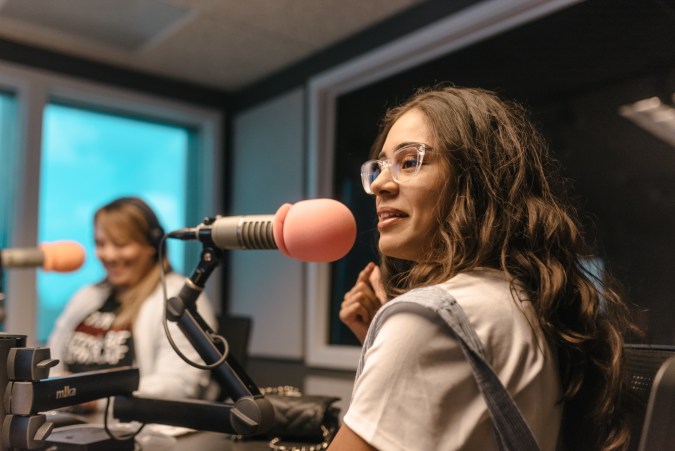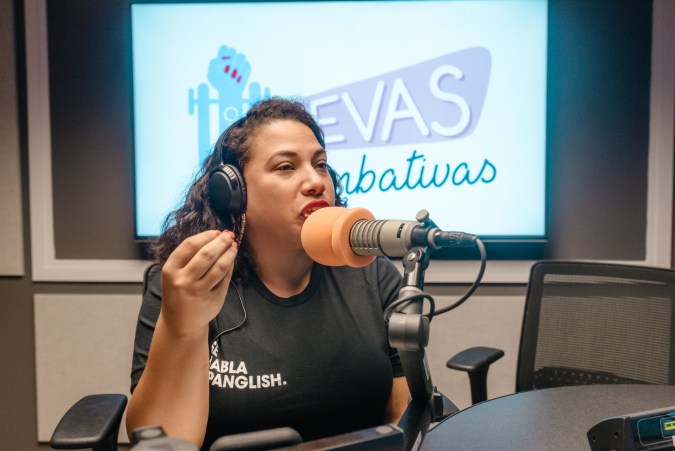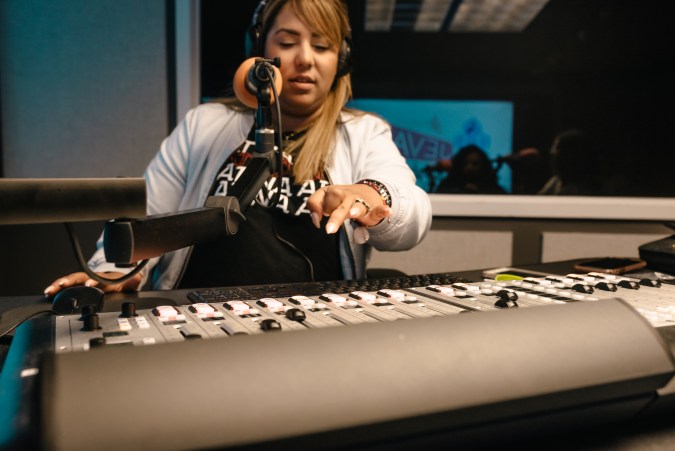Over the last five years, podcasts relaying feminist thought and conversations between Latinas have started flourishing. From Locatora Radio to Bag Ladiez and Bitter Brown Femmes—each series is unique, tackling intersectional feminism and social justice through a variety of lenses, including academic theory, music, humor and more. However, our voices have largely remained absent from these discussions on the radio. In Orlando, Florida, a group of Latinas are combating the machismo in broadcast journalism through Jevas Combativas, the only Spanish-language feminist commercial radio show in the country.
While podcasts have become an imperative space for Latinas to have critical and nuanced dialogue around gender politics, Spanish-language stations continue to be less democratic, with listeners more likely to hear male hosts making ‘50s era-style sexist quips than even the cadence of a woman’s voice.
Jevas Combativas, which connotes luchadoras, is a show and transmedia project disrupting dominant narratives on Spanish-language radio by discussing issues pertinent to the burgeoning Latino population in Central Florida. That includes reproductive justice, gender violence, racial justice, police brutality, immigration, climate change and more.
The primary objective of the co-hosts—Stephanie Loraine Piñeiro, Krizia Ivelisse López Arce and Adriana Jiménez Bermúdez—is to offer anti-patriarchal education that helps women tackle machismo and injustices in their daily lives. They do that through candid discussions and interviews with community leaders, experts and professionals as well as providing resources to their listeners.

“We wanted to create a space where we could provide information to people in Spanish,” Bermúdez, a 25-year-old activist and communications professional who moved from Puerto Rico to Florida after Hurricane María, tells Remezcla. “There is a lot of feminist and [historical] content that exists, but it’s in English. Even when it is about Latinos, it’s often still in English.”

The show first hit airwaves on Mega 97.1 on August 3, 2019, months after executive producer and creator Iza Montalvo, the founder and managing partner at Olán—a communications firm creating empowering, advocacy-driven content for multicultural audiences—pitched the idea to local media executives. Jevas Combativas hopes that the show’s success in Orlando could lead to similar programs on Spanish-language radio stations around the nation.
On air—and through its accompanying podcast and social media platforms—Jevas Combativas is already garnering praise for engaging in crucial and timely conversations that are often snubbed in Latino radio, likely due to pressure from advertisers, or rushed through with little to no analysis. Throughout the month of June, for instance, the hosts centered most of their 60-minute Saturday morning shows around racial justice and police violence as a response to the recent police killings of George Floyd, Breonna Taylor and Ahmaud Arbery as well as the national Black Lives Matter protests that those deaths ignited.

While many other Spanish-language radio shows in the city and across the country took an All Lives Matter approach that condemned looters as much, if not more, than killer cops, Jevas Combativas interviewed Black Latina scholars and community leaders and also held discussions themselves about white privilege and anti-Blackness among non-Black Latinos. During these segments, they offered listeners examples of how anti-blackness appears in Latino culture in insidious and blatant forms and shared tools and resources on how to navigate difficult but necessary conversations with relatives to stomp out anti-Black racism.
“What we really like about being on the radio format is the ability to reach people who normally wouldn’t listen to you,” the show’s producer and co-creator Piñeiro, a 28-year-old Florida-raised Boricua, says. “When you have a podcast, people searched for that podcast or maybe it was recommended to you. But when you’re on the radio, you’re just flipping through stations and stop when you hear a familiar language talking about stuff, some of it might be controversial, some of it you agree with or don’t agree with, but all of it makes you think.”

Between radio station DJs rotating reggaetón, Latin trap, salsa and merengue hits that usually center on the male singer’s sexual prowess are the jevas challenging stigmas and providing listeners with valuable information about female sexuality and pleasure, HIV and STI testing, abortion rights and access, queerness, body image and diet culture, sexual violence and harassment as well as gender pay gaps and so much more.

“We are on a radio station that’s popular for playing reggaetón, and we are aware of that. For our audience, these topics aren’t typically covered on the stations they listen to or maybe in other media they consume. So it’s both about personal growth and community growth. We are talking about things happening, how we can better ourselves, us three as women, to also better our communities,” Bermúdez says.
With the rise of music streaming services and podcasts, some media scholars and enthusiasts have insisted that radio is dead. However, media executives aiming to reach Latino audiences know that for this market, radio is not only alive; it’s gravid. According to Nielsen, 98% of Latinos tune into the radio each week, listening to the medium more and for a longer period of time than other ethnic and racial groups in the country. Additionally, as the Latino population continues to swell in the US, radio listenership among the group is growing, not declining. This is evident in the Greater Orlando Area, which has one of the fastest-growing Latino populations in the country, with migrants hailing largely from the Caribbean and South America but also from Mexico, Central America as well as Latino cities throughout the US.

While Latino radio, which has its roots in the 1920s Southwest, is blossoming across the nation, the gender makeup of hosts (as well as sexist one-liners and the unapologetic objectification of women) hasn’t changed as much.

“This has always been male terrain, for many years. And even now, where there are women, it’s still majority men,” Arce, a 33-year-old co-host and production assistant who worked several years in Puerto Rico radio before moving to Orlando following Hurricane María, says. “What I like about this show is that it is created and produced by us, by women, and we can bring topics—like equity and equality—in this space. We can have these conversations and we can document these experiences.”
And women are resonating with their content. According to iHeartMedia analytics, 56% of listeners are women, and most are millennials like the hosts themselves. On Instagram and Facebook, the jevas regularly receive positive feedback from women and femmes who thank them for speaking honestly about taboo topics and providing them with tools to tackle the various -isms they encounter throughout their day.
For the co-hosts, who ground Jevas Combativas in feminism, balance and justice, the show has also been empowering.

“In media spaces and social justice spaces, I don’t always feel heard. I’m frequently talked over and I’m not taken seriously, whether because I’m young or because I’m a woman,” Bermúdez says. “But here we created a space where we can talk, provide resources and push an agenda forward, and for me, that is an act of resistance. It doesn’t matter if you pushed us out. We’re still here. And guess what: We just got louder.”
Catch Jevas Combativas every Saturday at 9 a.m. ET on Mega 97.1, listen to their podcast on all major platforms and follow them on Instagram and Facebook.




